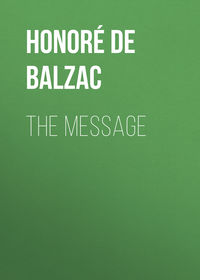Kitobni fayl sifatida yuklab bo'lmaydi, lekin bizning ilovamizda yoki veb-saytda onlayn o'qilishi mumkin.
Kitobni o'qish: «The Message»
THE MESSAGE
I have always longed to tell a simple and true story, which should strike terror into two young lovers, and drive them to take refuge each in the other's heart, as two children cling together at the sight of a snake by a woodside. At the risk of spoiling my story and of being taken for a coxcomb, I state my intention at the outset.
I myself played a part in this almost commonplace tragedy; so if it fails to interest you, the failure will be in part my own fault, in part owing to historical veracity. Plenty of things in real life are superlatively uninteresting; so that it is one-half of art to select from realities those which contain possibilities of poetry.
In 1819 I was traveling from Paris to Moulins. The state of my finances obliged me to take an outside place. Englishmen, as you know, regard those airy perches on the top of the coach as the best seats; and for the first few miles I discovered abundance of excellent reasons for justifying the opinion of our neighbors. A young fellow, apparently in somewhat better circumstances, who came to take the seat beside me from preference, listened to my reasoning with inoffensive smiles. An approximate nearness of age, a similarity in ways of thinking, a common love of fresh air, and of the rich landscape scenery through which the coach was lumbering along, – these things, together with an indescribable magnetic something, drew us before long into one of those short-lived traveller's intimacies, in which we unbend with the more complacency because the intercourse is by its very nature transient, and makes no implicit demands upon the future.
We had not come thirty leagues before we were talking of women and love. Then, with all the circumspection demanded in such matters, we proceeded naturally to the topic of our lady-loves. Young as we both were, we still admired "the woman of a certain age," that is to say, the woman between thirty-five and forty. Oh! any poet who should have listened to our talk, for heaven knows how many stages beyond Montargis, would have reaped a harvest of flaming epithet, rapturous description, and very tender confidences. Our bashful fears, our silent interjections, our blushes, as we met each other's eyes, were expressive with an eloquence, a boyish charm, which I have ceased to feel. One must remain young, no doubt, to understand youth.
Well, we understood one another to admiration on all the essential points of passion. We had laid it down as an axiom at the very outset, that in theory and practice there was no such piece of driveling nonsense in this world as a certificate of birth; that plenty of women were younger at forty than many a girl of twenty; and, to come to the point, that a woman is no older than she looks.
This theory set no limits to the age of love, so we struck out, in all good faith, into a boundless sea. At length, when we had portrayed our mistresses as young, charming, and devoted to us, women of rank, women of taste, intellectual and clever; when we had endowed them with little feet, a satin, nay, a delicately fragrant skin, then came the admission – on his part that Madame Such-an-one was thirty-eight years old, and on mine that I worshiped a woman of forty. Whereupon, as if released on either side from some kind of vague fear, our confidences came thick and fast, when we found that we were in the same confraternity of love. It was which of us should overtop the other in sentiment.
One of us had traveled six hundred miles to see his mistress for an hour. The other, at the risk of being shot for a wolf, had prowled about her park to meet her one night. Out came all our follies in fact. If it is pleasant to remember past dangers, is it not at least as pleasant to recall past delights? We live through the joy a second time. We told each other everything, our perils, our great joys, our little pleasures, and even the humors of the situation. My friend's countess had lighted a cigar for him; mine made chocolate for me, and wrote to me every day when we did not meet; his lady had come to spend three days with him at the risk of ruin to her reputation; mine had done even better, or worse, if you will have it so. Our countesses, moreover, were adored by their husbands; these gentlemen were enslaved by the charm possessed by every woman who loves; and, with even supererogatory simplicity, afforded us that just sufficient spice of danger which increases pleasure. Ah! how quickly the wind swept away our talk and our happy laughter!
When we reached Pouilly, I scanned my new friend with much interest, and truly, it was not difficult to imagine him the hero of a very serious love affair. Picture to yourselves a young man of middle height, but very well proportioned, a bright, expressive face, dark hair, blue eyes, moist lips, and white and even teeth. A certain not unbecoming pallor still overspread his delicately cut features, and there were faint dark circles about his eyes, as if he were recovering from an illness. Add, furthermore, that he had white and shapely hands, of which he was as careful as a pretty woman should be; add that he seemed to be very well informed, and was decidedly clever, and it should not be difficult for you to imagine that my traveling companion was more than worthy of a countess. Indeed, many a girl might have wished for such a husband, for he was a Vicomte with an income of twelve or fifteen thousand livres, "to say nothing of expectations."
